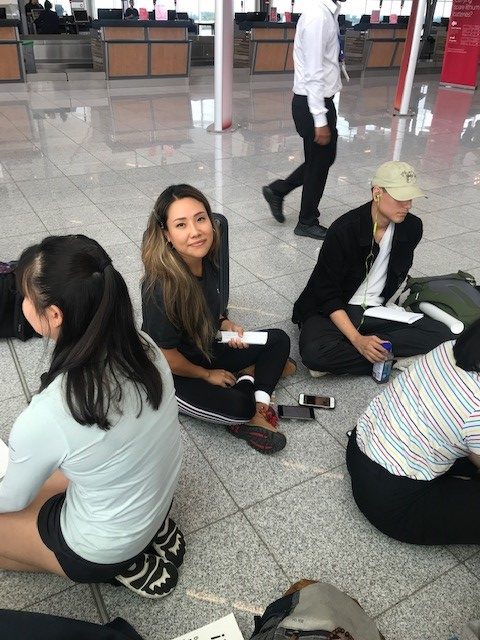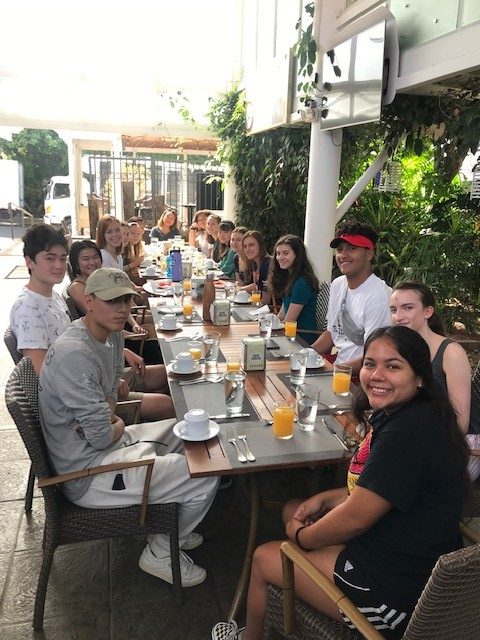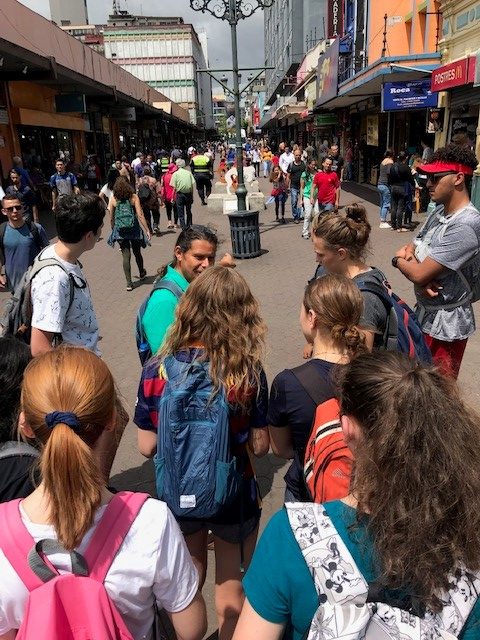On July 1st our flight to Costa Rica went longer than planned. Our plane needed to stop in Florida so we could switch planes. Due to pressurization issues, our masks where going to drop! Thankfully, our pilot and crew got us to our destination, San Jose, Costa Rica, safe and sound. The Experiment group consisted of 16 students (3 boys and 13 girls), plus two leaders. Upon arrival, we were all met by our in-country local guides, Maguil and Gravin. From the airport, we had a short private bus ride to the Hotel Riviera and went straight to bed. In the morning breakfast was divine with rich, Costa Rican coffee and heaping plates of gallo pinto, fruit, pancakes, eggs, etc. This day, the students had their first orientation to Costa Rican culture and language along with a fun trip to a local market for lunch and a scavenger hunt. After all the daytime activities, combined with a bit of rain during the day, we retreated to the hotel to enjoy the pool and view of the highlands before a very early morning.





With a Breakfast to go, we got on the road to the Titi Canopy tour. On our drive there, we stopped to see crocodiles! What great big creatures with big appetites- thank goodness none of us landed on their plates! The excitement of the day then commenced when we arrived to learn that we’d be flying through the air, over and through the forest’s canopy, hopping from 20 platforms on 10 lines. We had the chance to race one another in the sky, and like birds taking flight, we leapt into the air soaring next to the tree tops. We ended our time in the sky by rappelling off the last platform, which was a straight drop down to the ground, and then climbing up a net to then swing to the ground on the Tarzan swing. Literally, breathtaking. With no time to waste, we got back on the road for a five hour bus ride to the Sierpe National Wetland, and to our one night’s stay in one of the largest wetlands in Central America. After a big dinner and a birthday celebration for one of the students, Julia, we packed our small bags for our next big adventure: a bio reserve in the lowland tropical rainforest called Campenario Bio Reserve.
To get there, we woke up at 4:30am, climbed into a boat, knowing full well we’d be sharing the waters with crocodiles and other marine creatures such as dolphins and snakes, and with life vests fully secure, we began our trip on the river toward the ocean. Once there, we spent 4 days and 3 nights with local naturalists, biologists and teachers learning about everything from tropical flora and fauna, endangered species and marine life and how we can be advocates and conservationists. During our hikes in the jungle we saw monkeys, sloths, tropical birds, iguanas, snakes, butterflies, spiders, tapirs, and so much more! One night, we had a momma tapir and her baby come to eat mangos right next to the biological station and we observed them from a safe distance, munching away and enjoying their sweet dinner. The really daring of the group, which turned out to be everyone, went to hike at dusk to a bat cave to learn about these incredible creatures- and even catch them with our hands! Some interesting facts about bats is that they aren’t blind, they see extremely well. We should appreciate these tiny mammals because they help control the mosquito and bug population. Some bats can swim and their wings repair fast when they tear and there really is a blood-sucking bat. Fortunately, they don’t go for human necks, they find other animals for that.





We lived those days mindful of our ecological footprints, only taking as much food as we could finish and washing our clothes by hand. After all the beautiful sunsets, the many opportunities to snorkel and swim in the Pacific Ocean, a few days of hiking and then one long day hike to the Corcovado protected reserve with two different water holes to get ourselves wet in and a waterfall to behold, we had to say goodbye and head back to mainland towards La Palma community to meet our host families. Our short time at the biological reserve wasn’t too devastating because we were very excited to meet our Costa Rican families.
To date, we’ve been with our families for six days now and we’ve had so much fun. Whether it’s been cooking together, riding horses, playing bingo, or simply going to the beach to play soccer and volleyball, we can already appreciate the cultural immersion piece to our program. Our families love us and take such good care of us. We are all well fed and get plenty of rest. As for our community service work, the project we have is a big, and very important one. Most days, we meet at 7:30am to start before the sun (or rain) comes out. We are cleaning up an elementary school, taking fresh paint to the front of the building and the surrounding corridor and adding new touches: murals on the face of the school, games on the cement, new grass in the playground, and a big garden for the little ones. We have six more days here and then, on to the next project: turtle conservation work.





